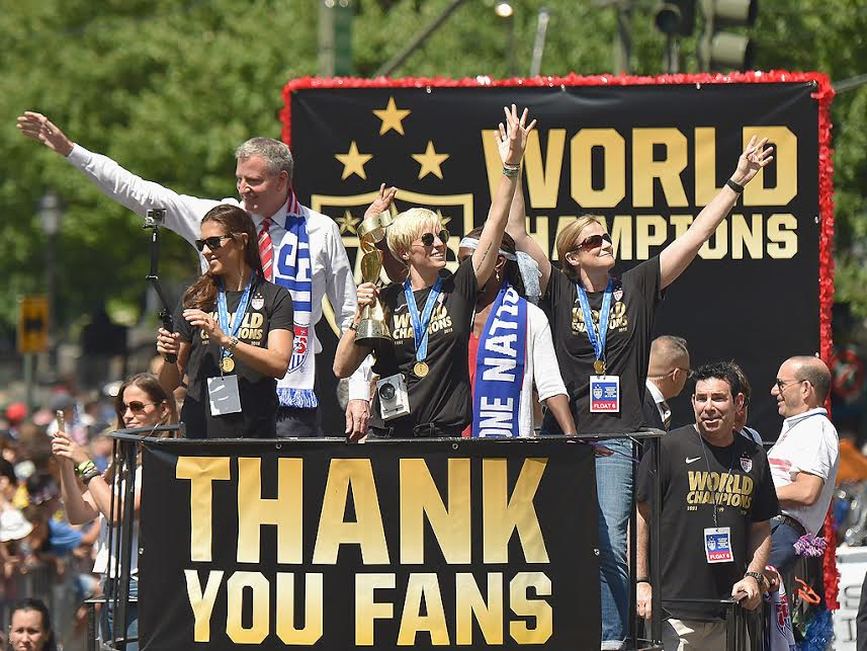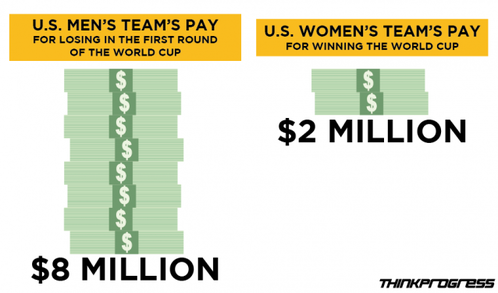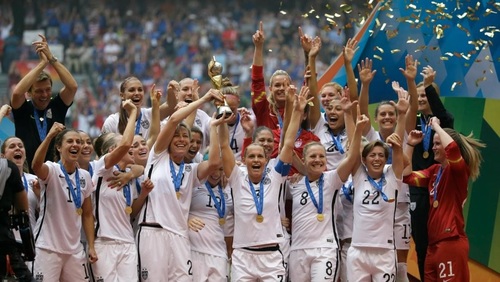 Still, the Women’s World Cup final game soared to the top as the most watched soccer game in US history for men or women. After the cheers have subsided and the after-glow of celebrations are relegated to sport’s history, the success of the women’s team will affect forever how equality in women’s sports is debated and ultimately achieved. The women’s soccer team advocated for parity before taking a rightful place among American team champions. In 2014 in advance of the championship games to be played in Canada, US women’s players led by Abby Wambach and Alex Morgan filed a law suit against FIFA and the Canadian Soccer Association when it was learned that the women’s world cup would be played on artificial turf. The women contended artificial surfaces exacerbate injuries and change the game. Legal representative for the US women and Canadian groups Rocky Collins put the case before the Human Rights Tribunal in Ontario, Canada, according to a report in the Los Angeles Times. "When the men say they want grass, they get it. And for the women, there just isn't a concern on behalf of FIFA or Canadian soccer for what the women want or deserve," Collis said. Last May in an astonishingly punitive decision, the women’s national team forward Abby Wambach said soccer’s international governing body rejected a free offer to put grass fields down for the upcoming Women’s World Cup in Canada, reported by the Washington Times. Wambach has been a vocal critic of using artificial turf for the World Cup, claiming it amounts to gender discrimination because her male counterparts would never be asked to play soccer’s premier tournament on artificial grass, they said. The initial law suit was dropped when it became clear FIFA would not change the field surface even if they lost. FIFA did agree to play the 2019 women’s World Cup on grass. Turf selection is not the only area where women are treated unfairly by FIFA. Pay equity is a contentious issue with professional women’s sports teams, and this year’s disparity between men and women in soccer serves as a stark reminder there is a lot of work to be done to achieve comparable worth. For their championship win the US team will receive $2 million from FIFA. Think Progress reports “the championship prize for women pales in comparison to the $8 million in prize money awarded to men’s teams who lost in the first round. Every men’s team was awarded $1.5 million just for participating.”  Wage and opportunity gender gap in colleges and professional sports Both amateur and professional sports have been affected by the wage gap. Women’s team sports in colleges and universities, as well as the coaches, receive smaller budgets than their male counterparts. Coaches for women’s teams earn 63 cents for every dollar earned by coaches for men’s teams. As evidenced by the prize money disparity between men and women in professional soccer in World Cup competition, women are lagging behind men in prize money, sponsorship commitments and endorsements. Pay discrepancy is explained from the perspective of world corporate sponsorship. In the past women’s sports has not drawn the name recognition of men’s sports; therefore, companies are less willing to pay large amounts to advertise with female athletes. The Women’s World Cup brought in $17 million in sponsors this year, compared to $529 million in sponsors for last year’s men’s World Cup, according to the Wall Street Journal. As fans and spectators, we forget professional sport is a business first and foremost. Investors and owners are just as interested in profits and as your local investment banker, which became painfully evident with the recent FIFA scandal involving alleged corruption, money laundering, bribery and racketeering. Despite the business aspect, there is an expectation of ethical practices not only among professional athletes but also by many owners and organizations. Ethics is an important part of sports, and professional athletes are held to a high standard of behavior on and off the field. They are seen as role models for young people. Scandals by players or team organizations have a tarnishing effect on the image of the sport which discourages sponsorship. If individual women and women’s team sports are treated unfairly in pay and opportunity, the message to young girls is expect less because you are not as worthy as men. This is not representative of American progressive ideals, and the tremendous response to the Women’s World Cup this year advances the concept that the roles of women are equal in professional sports. If name recognition is key to garnering corporate sponsorship, then women’s soccer has taken a giant leap for womankind. Resources http://www.people.com/article/us-womens-soccer-team-ticker-tape-parade-nyc http://www.latimes.com/sports/soccer/la-sp-soccer-baxter-20141026-story.html http://thinkprogress.org/sports/2015/07/06/3677105/fifa-will-pay-us-womens-championship-team-4-times-less-mens-teams-lost-first-round/ http://www.washingtontimes.com/news/2015/may/9/wambach-fifa-turned-down-grass-offer-for-womens-wo/#ixzz3fnLIn2pa http://www.ibtimes.com/fifa-soccer-corruption-scandal-swiss-prosecutors-say-they-have-more-evidence-money-2004682
3 Comments
Eileen
15/7/2015 10:13:07 am
Kudos to the US womens team who have won more than once and to the viewing public getting behind the team.
Reply
Dava Castillo
16/7/2015 02:06:21 pm
Thank you for reading and commenting Eileen.
Reply
Eileen
16/7/2015 02:17:08 pm
Womens football is finally catching on in the UK. That should lead to better pay in the future but UK male footballers are so over paid it may be sometime before the women catch up.
Reply
Leave a Reply. |
Dava Castillo
is retired and lives in Clearlake, California. She has three grown
children and one grandson and a Bachelor’s degree in Health Services
Administration from St. Mary’s College in Moraga California. On the
home front Dava enjoys time with her family, reading, gardening, cooking
and sewing. Archives
November 2015
|


